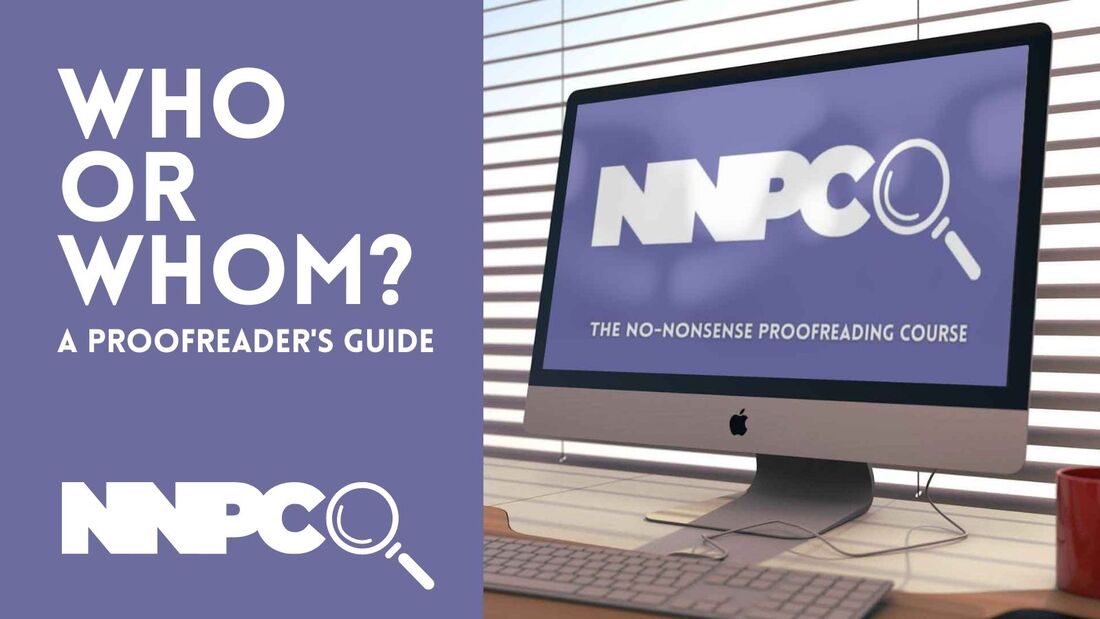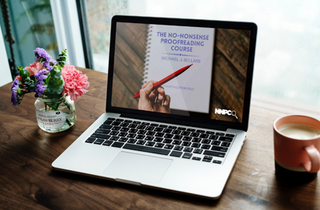|
In today's fast-paced world, concentration is one of the most valuable skills we can possess. And in the world of proofreading, this is doubly so. For the proofreader, concentration is key. However, with so many distractions around us, it can be difficult to stay focused for extended periods. Fortunately, there are techniques you can use to maintain your concentration and improve your productivity. Here are some of the most effective techniques for maintaining concentration:
Minimize Distractions
Take Breaks
Prioritize Tasks
Use Time Management Techniques
Practice Mindfulness
Get Enough Sleep
By using these techniques, you can maintain your concentration, improve your productivity, and achieve your goals more efficiently. Remember that everyone is different, so experiment with different techniques to find what works best for you. With practice, you can train your brain to maintain focus and achieve your desired outcomes.
0 Comments
The words 'who' and 'whom' are often used interchangeably in everyday conversation, but they have different functions and are used in different contexts. Understanding the difference between 'who' and 'whom' can help you communicate more effectively and avoid common grammar mistakes.
'Who' and 'whom' are both pronouns, and they are used to refer to people. The difference between them is that 'who' is the subject of a sentence or clause, while 'whom' is the object of a verb or preposition. For example: 1. Who is going to the party tonight? 2. Whom did you invite to the party tonight? In the first sentence, 'who' is the subject of the verb 'is going.' It is asking for the identity of the person who is performing the action of going to the party. In the second sentence, 'whom' is the object of the verb 'did invite.' It is asking for the identity of the person who is receiving the action of being invited to the party. Another way to determine whether to use 'who' or 'whom' is to look at the function of the pronoun in the sentence. If it is the subject of a verb, use 'who.' If it is the object of a verb or preposition, use 'whom.' For example: Who is calling me on the phone? To whom should I address this letter? In the third sentence, 'who' is the subject of the verb 'is calling.' It is asking for the identity of the person who is performing the action of calling. In the fourth sentence, 'whom' is the object of the preposition 'to.' It is asking for the identity of the person to whom the letter should be addressed. While it is always correct to use 'who' as the subject of a sentence or clause, the use of 'whom' is becoming less common in modern English. In some cases, it may be considered more formal or old-fashioned. In informal speech or writing, it is often acceptable to use 'who' instead of 'whom.' For example: Who did you give the book to? (Informal) To whom did you give the book? (Formal) In conclusion, 'who' and 'whom' are both pronouns used to refer to people, but they have different functions. Use 'who' as the subject of a sentence or clause, and use 'whom' as the object of a verb or preposition. While it is always correct to use 'who' as the subject, the use of 'whom' is becoming less common in modern English and may be considered more formal or old-fashioned. In informal speech or writing, it is often acceptable to use 'who' instead of 'whom.' So, what's new in the Fourth Edition of The No-Nonsense Proofreading Course?
Firstly, the format. Feedback from my customers strongly indicated most people enjoyed the material on their laptops and iPads. So I've gone for a landscape ratio, so there's no more pinching and scrolling. It's still A4, so if you want to print it out, you can. I've spruced-up the design, too. I hope you like it! I've updated the business section. Some of the links were pointing to sites that have ceased to operate. I've also added a few newcomers (e.g. Unsplash for sourcing promotional images, and some new freelance markets). And that's pretty much it. The core of The No-Nonsense Proofreading Course was and, and remains, the same proofreading method I've been successfully using for more that thirty years. The plan is to update The No-Nonsense Proofreading Course yearly, weeding-out dead links and pointing readers in the direction of new useful resources. In today's digital age, having a website is essential for businesses of all sizes. A website is often the first point of contact for potential customers and can make a lasting impression on them. Therefore, it is crucial for businesses to ensure that their website is not only visually appealing but also free of errors. This is where proofreading comes in.
Proofreading is the process of carefully examining a text for errors in spelling, grammar, punctuation, and syntax. It is a crucial step in the website development process, and it can help businesses to enhance their online presence and reputation. Here are some reasons why it is essential for businesses to have their websites proofread: Avoids embarrassing mistakes: Spelling and grammar errors on a website can make a business appear unprofessional and careless. It can also create confusion for visitors, leading them to misunderstand the message or even lose trust in the business. Proofreading helps to ensure that the website is error-free, which helps to maintain the business's credibility and professionalism. Enhances user experience: A website that is free of errors is easier to read and navigate, providing visitors with a better user experience. This, in turn, can lead to increased engagement, longer visit times, and ultimately, more sales. Boosts search engine optimization: Search engines, such as Google, favor websites that are well-written and error-free. A website that has been proofread is more likely to have a higher search engine ranking, which can help to attract more visitors and increase visibility. Consistency in messaging: A business's website is often its primary communication tool, and it is essential that the messaging is consistent across all pages. Proofreading helps to ensure that the messaging is clear, concise, and consistent, which can help to reinforce the brand's identity and messaging. Saves time and money: Fixing errors on a website after it has been published can be time-consuming and costly. Proofreading before publication can help to avoid these issues, saving time and money in the long run. The importance of proofreading cannot be overstated. However, it can be challenging to spot errors in your own writing, which is why it is beneficial to seek the help of a professional proofreader or to take a proofreading course. The No-Nonsense Proofreading Course is an excellent resource for businesses looking to improve their proofreading skills. This course is designed to teach individuals how to identify common errors in writing, how to correct them, and how to improve the overall quality of their writing. The course is user-friendly, comprehensive, and provides hands-on practice to help users apply what they have learned. In conclusion, having an error-free website is essential for businesses to attract and retain customers, enhance their online presence, and maintain their credibility and professionalism. Proofreading is an essential step in the website development process, and it is worth investing in to ensure that the website is error-free. The No-Nonsense Proofreading Course is an excellent resource for businesses looking to improve their proofreading skills and enhance the quality of their writing. |
Details
Testimonials
“I am one of those many fools who paid a huge amount of money for a useless course. This book... has opened so many doors for me. I now look on Mike as my mentor as I embark on a career. Thank you Mike.” Emma Steel, Proofreader and International Structural Editor. “ I thoroughly enjoyed the course and am so glad that I decided to take it... the whole experience was invaluable. My proofreading service is now well established and your course played no small part in getting it off the ground.” Hache L. Jones, Proofreader. “I'd just like to thank you first of all for writing such a great, straight forward eBook, and then going above and beyond what I would even expect as a customer by providing us, completely free of charge, updated versions months later!” Rachel Gee, Trainee Proofreader. “What can I say? Worth every penny and then some! God Bless! This a fabulous course.” Teresa Richardson, Proofreader. “As someone who has effectively been proofreading for thirty years, I found Mike’s No-Nonsense Proofreading Course an invaluable introduction and a very useful practical guide to many aspects of this discipline. I can wholeheartedly recommend it as the ideal starting point, and much more besides.” Jeremy Meehan, Proofreader. Blog AuthorMy name's Mike Sellars and I'm an experienced proofreader and the author of The No-Nonsense Proofreading Course. Click here to find out more about me. The No-Nonsense Proofreading CourseA Fraction of the Cost of Other Proofreading Courses NOTE: Stock is currently limited to 10 per day, so we can continue to deliver exceptional after-sales service, answer queries and provide open-door support. Credit card and PayPal payments accepted. “As someone who has been proofreading for 30 years, I found Mike’s course an invaluable introduction and a very useful practical guide to many aspects of the discipline. I can wholeheartedly recommend it.” Jeremy Meehan, Proofreader. Still want to find out more? Click here. Proofreading Categories
All
Proofreading Archives
July 2024
|





 RSS Feed
RSS Feed
